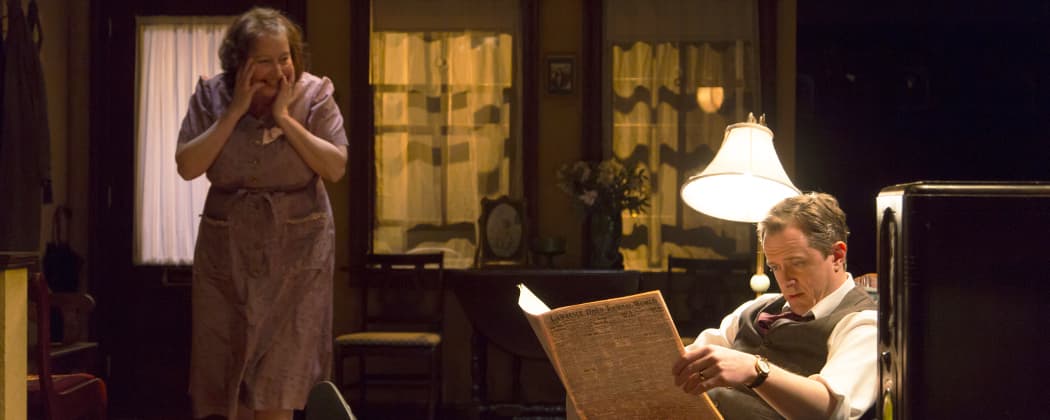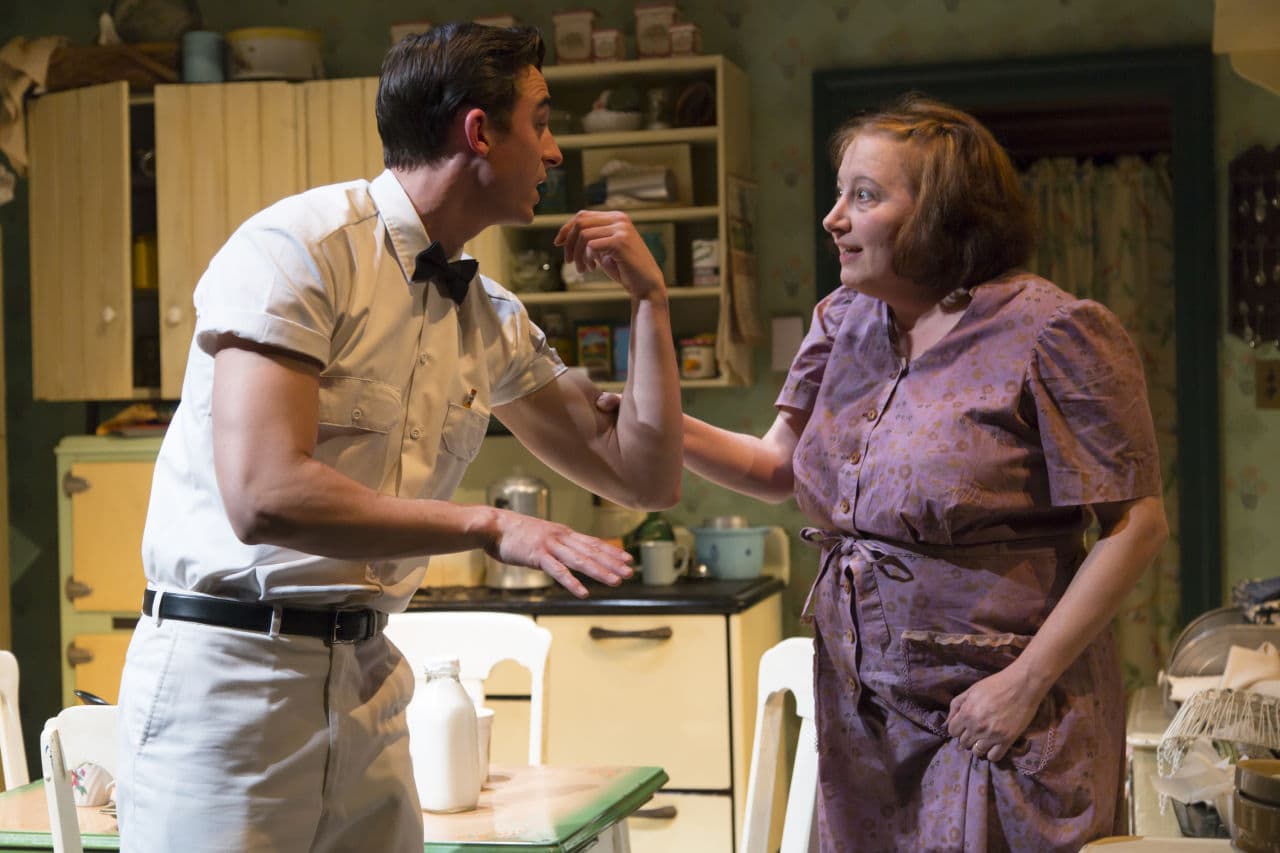Advertisement
Huntington's 'Come Back, Little Sheba': Frozen In Time, Steaming With Feeling

In “Come Back, Little Sheba” (at the Calderwood Pavilion through April 26), the heroine’s diminutive dog has gone missing. So have her youth and her looks, along with her naïve dream of what her life would be. It is 1950, and Lola Delaney, living in a folksy vacuum with her chiropractor husband Doc, a recovering alcoholic, is so starved for human contact that she routinely jumps those faithful gentleman callers, the mailman and the milkman, offering them cold drinks and chatty desperation. Doc, for his part, keeps his eye on the daily grind and a likely arid future, refusing to yearn for the rose-colored past in which Lola lolls and rolls like, well, little Sheba looking for a scratch. When Marie, the couple’s pretty collegiate boarder, starts to steam the place up with a track-star hunk whose sexy sinews she’s drawing (when not engaging in some “tall spooning”), Lola plays the wistful voyeur while the mild-mannered Doc, his nose rubbed in memories of long-ago lust and entrapment, turns poison into poison.

Kansas-born Pulitzer winner William Inge’s dramas don’t get much respect anymore, though “Picnic,” “Bus Stop” and “Sheba” were all made into films, this one winning a 1953 Oscar for Shirley Booth (who had already won a Tony for her turn as the sloppy, aching Lola). Director David Cromer, who replicated his intimate and incisive revival of “Our Town” for the Huntington Theatre Company in 2012, returns to the Roberts Studio to make a case for “Sheba” as not only painstakingly realistic but also existential. And it goes without saying that the play’s fixation on fleeting youth is hardly a thing as peculiar to the 1950s as, say, “Howdy Doody” and Jell-O salad.
In contrast to “Our Town,” which is famously staged on a bare stage with just a few props (a tradition Cromer respected while adding a stunning coup de théâtre at the end), “Sheba” is spread across the Delaneys’ cramped and realistic downstairs. In the kitchen Doc meticulously measures coffee, and in the shabby parlor he and the lonely Lola listen to “Fibber McGee and Molly” on a radio the size of R2-D2. Not much happens, but Cromer allows the play its detail and its silences while gently prodding its sad interstices.

“Come Back, Little Sheba,” with its quotidian goings on and rather obvious central metaphor, is not a towering drama. But this production is beautifully realized, neither corny nor quaint but both merciless and sympathetic. And when the vitriol briefly erupts, it’s terrifying. One senses the monster, and the victim, in all of us — so much so that the ending, with its hopeful talk of canned pineapple juice and renewed commitment, seems more Band-Aid than bromide. Of course, you cannot absolutely know: Lola, accepting the truth that little Sheba is gone for good, calls to mind Edward Albee’s more scathing George and Martha letting go of their imaginary child to face the fact that they may have ought to cling to but each other.
But if the childless Doc and Lola are George and Martha, or maybe Vladimir and Estragon with a pan to boil their carrots in, they are also Ozzie and Harriet with the inane surface not so much scratched as rent. The production opens on Stephen Dobay’s cutaway period set, with its old-fashioned appliances and worn rugs. On a high shelf between kitchen and “front room” looms, like Chekhov’s gun, a full bottle of the whiskey Doc no longer touches. We watch Doc wordlessly assemble the coffee, make an apron of a dish towel before turning a faucet on last night’s dishes, and say a silent prayer before Marie breezes in and out in her nighty, followed by blowzy Lola in bed head and curlers. (The latter changes from robe to housedress right there in the kitchen.) It’s all very buttoned-up and kitchen-sink, but clearly more is percolating than the coffee. And eventually it boils over.
It is a credit to the actors that the eruption is searing rather than just melodramatic. All of the performers, even in minor roles, are competent and, in the case of Michael Knowlton’s gym-rat milkman eager to share his photo in a fitness magazine, even touching. Moreover, Marie Polizzano’s Marie manages to roll vixen and bobbysoxer into one, with Max Carpenter proudly shallow as her earthier suitor (the one Doc considers indecent) and Nael Nacer politely enamored as the more marriageable one.
But any production of “Sheba” hinges on its Lola and Doc. As the former, Adrianne Krstansky delivers a performance low on vanity but high on earnestness. Shrieking with delight at a card trick she’s seen her husband perform 100 times, swooning before the radio as it beckons her to a show called “Taboo,” nattering cheerfully on at anyone who’ll listen about her long-gone prettiness and Doc’s more recent alcoholism, she’s a loser but a well-intended, slightly lost one. There are also glimmers of competence, as when she transforms her messy house in an afternoon or snaps herself together to telephone an AA posse when Doc launches himself off the wagon like a rocket. And as Doc, Derek Hasenstab is convincing as both the tolerant if disappointed husband Marie finds so “nice” and as the anguished, booze- and hate-fueled lion that threatens to make chops of Lola’s not-quite-innocent lamb. Little Sheba isn’t coming back, and, horrified if also empathetic, you hope this guy isn’t either.
Carolyn Clay was for many years the theater editor and chief drama critic for the Boston Phoenix. She is a past winner of the George Jean Nathan Award for Dramatic Criticism.

